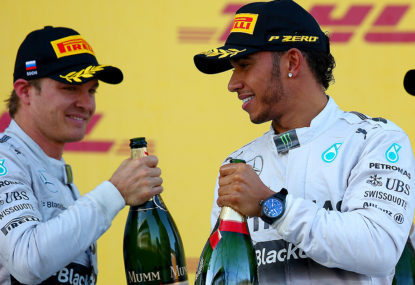It's rewarding mediocrity so every driver wins a prize: Why it should be 'all or nothing' if F1 changes its points system
Given how exclusive and precious a commodity scoring an F1 point is, why is it that mediocrity should be rewarded?

The British Grand Prix is one of the handful of races teams are particularly desperate to win. Silverstone is a jewel in the crown of Formula One, alongside Monte Carlo, Monza, and Spa.
To throw away a win around Silverstone, then, is tantamount to blasphemy. Did Williams commit a sin?
First stint pace
With Silverstone dominated by high-speed corners, following another car is difficult due to the trailing dirty air. Overtaking is difficult unless one car has a significant pace advantage over another.
The key moment that catapulted Williams into victory contention was their lightning starts. From P3 and P4 on the grid, Felipe Massa and Valtteri Bottas rocketed ahead of both Mercedes before the first turn, holding those positions after the safety car.
Williams was looking good to capitalise – until Bottas started harrying Massa for the lead from Lap 7.
The team moved on Lap 11 to command its drivers to hold position. It didn’t go down well with Bottas.
“I have more pace. I can overtake, I can do it on the back straight,” he pleaded over the radio.
His superior pace on the medium tyres as he darted over the back of Massa’s car was obvious.
“It has to be a clean move,” his engineer radioed back. “And you have to pull away when you’re in front.”
But by this point following Massa in the dirty air had taken the edge off his tyres, and he was unable to mount another challenge. How much time had he lost?
“I’m guessing half a second a lap, because on the in lap I could do nearly a second quicker,” answered Bottas.
Could having Bottas in the lead have won Williams the race? Potentially.
However – and this is a big however – that would rely on Williams making the admittedly devastating call for Massa to let his teammate pass. Should they have done it?
The decisive pit stop
I’ve done the maths so you don’t have to. Subtracting half a second from Bottas’ lap times between Lap 9 – when he was stuck behind Massa – and the pit-stop window on Lap 20 puts Bottas around 5.2 seconds ahead of Massa at his first pit stop.
Meanwhile, Mercedes knew it had pace in hand and tyre life to boot, so it pulled the trigger with Lewis Hamilton in an attempt to undercut their rivals.
Hamilton stopped on Lap 19 with a 1.2 second gap to the leader, Massa. The leader stopped on Lap 20, but Hamilton’s superior out lap meant Massa emerged three seconds behind Hamilton after exiting the pit lane.
If you’re still with me, here’s where the second half of the race could have produced a different result – Massa’s in lap was 1.3 seconds slower than Bottas’, which validates Valtteri’s claim to superior pace.
Combined with the 5.2 seconds Bottas gained by running in clear air ahead of Massa, Bottas, if he were the leader, would have had an 6.5 second buffer to play with on his out lap.
The 6.5 seconds would have negated Hamilton’s three-second advantage after the pit stops and had him emerge from the pits more than three seconds up the road.
Phew.
To interfere or not to interfere?
Even with hindsight the answer is not easy. Knowing the circuit, Williams would have fancied themselves to keep the Mercedes cars behind, with Hamilton transpiring to be only around half a second quicker. Think Massa versus Sebastian Vettel in Austria two weeks ago.
Why didn’t the team call for Massa to pass Bottas?
“This is Williams and we have our rules of engagement,” said the team’s head of performance, Rob Smedley. “The rules of engagement are such that we were happy to see them race as long as they were not holding each other up.”
Williams made a judgement call that Bottas wasn’t being unduly held up by Massa, and therefore saw no reason to interfere.
Bottas however, disagreed.
“It would have been nice to be able to race,” he said. “At that point when I had the best opportunities I wasn’t allowed to overtake. Then we were allowed to race after, but then I did not have that kind of opportunity again as the tyres started to wear behind him.”
Williams chose to interfere in the least offensive way, which was to preserve the racing order rather than dictate it. Had it scored its first win in this new era of the team (dub it the post-Maldonado era, if you will), doing so under the cloud of team orders, legal though they are, would have soured the day.
Could it have worked?
No.
What could never have been factored into the team’s plans was the rain, which arrived sporadically and with varying severity – and the Williams car handles like a shopping trolley in the rain.
Track position or not, Bottas would have almost certainly lost position, just as he did to Ferrari’s Sebastian Vettel in the dying moments of the grand prix. A Mercedes car would have been irresistible in rainy conditions.
But the Williams strategists weren’t to know. Had the rain never arrived, or had it remained light, Bottas was the man to bet on at a circuit where track position in a quick car is half the job done.
Had it been dry, would Williams have missed a trick? Should team orders have been called?
What would you have done?
Michael rarely talks about maths, so it’s safe to follow him on Twitter: @MichaelLamonato